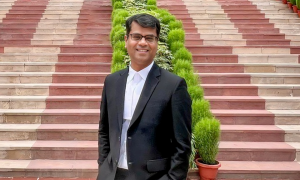 Sourav Dan is a graduate from KIIT Law School, batch of 2013. He has deep rooted interest in national and international Intellectual Property laws. He has worked in IP law for top notch law firms and in a very short period of time after graduation he has been appointed as a member of the Drafting Committee of Govt. of Maharashtra due to his expertise in the sector of IP laws. In this interview we asked him a few questions about:
Sourav Dan is a graduate from KIIT Law School, batch of 2013. He has deep rooted interest in national and international Intellectual Property laws. He has worked in IP law for top notch law firms and in a very short period of time after graduation he has been appointed as a member of the Drafting Committee of Govt. of Maharashtra due to his expertise in the sector of IP laws. In this interview we asked him a few questions about:
- Enduring interest and research work in IP laws
- Work at Anand & Anand and in the IPR wing of AZB partners.
- Being selected as a Drafting Committee member of the Govt. of Maharashtra
Tell us about your life before college.
Being the only child of working parents, a major part of my childhood was spent in a crèche. I studied at the Assembly of God Church School in Calcutta and was an average student. With my inclination towards Biology, the obvious choice was Science in 10+2. Initially, I wanted to be a doctor and even cleared the entrance exams, but I also gave the law entrance exams just as a fail-safe. However, as the saying goes: “Man proposes and God disposes”, I ended up being a lawyer, just like my parents. My father was an IP Attorney and my mother even though a law graduate never practiced until she retired from banking services.
How does a B.Sc. LLB differ from a B.A. LLB?
My Father was an IP Attorney. When he learnt that I have been called for the counseling program at KIIT, he advised me to opt for the B.Sc. LL.B. program as it would help me to understand the scientific background present in patent related issues. Academically speaking, it did give me an edge in understanding the patent cases taught at law school in the IP curriculum. Further, it also helped me in my IP (Hons.) Specialization. Given the scientific background, I was able to grasp the chemical structure, mathematical formulas and biological nomenclature easily. I would advise law aspirants to choose a stream keeping in view their professional aspirations. Given, the fact that many law schools provide options in choosing the stream, a proper understanding and knowledge of the course structure, faculty, infrastructure coupled with industry requirements shall prove beneficial in choosing a particular stream like BSc. LL.B, B.A. LL.B. or B.B.A. LL.B.
 What motivated you to start writing?
What motivated you to start writing?
It all started when I came across an essay competition organized by GNLU while I was in the field of IPR. The essay competition caught my eye as even five years back; it was hard to find essay competition dedicated to IP. It was vacation time and I literally had to write the essay all without any guidance or review. All I had was couple of books borrowed from the Law School Library and handful of articles from Westlaw. The only help I got was from my jurisprudence teacher, Mr. Ahmad Ali Khan who made me sit down with him and taught me the art of applying footnotes according to the Blue Book Edition. Even today, I remember most of the rules of Bluebook style of formatting (laughs). Quite surprisingly, I was adjudged as second in the essay competition and was called upon to receive the prize in the first convocation of GNLU. I believe it was this win, which propelled me to pen down more articles. There was no looking back after that. The best advice to get started in writing articles is to read more articles particularly from the reputed journals. I won’t single out any specific ones because the journal might contain articles which might be so complicated, that a young law student might not read it till the end and leave halfway disinterested and disgruntled. The safest bet is to choose articles on topics which one likes, it can be on any subject and read them. As you would read more, one would come across the underlying issues and then research more to find a solution to the issue and pen down the thoughts.
How would you select a specific journal and approach them for publication?
The more you read articles on a specified area of law, the better you know which journals are held in high regard. Primarily, I have seen the reputation as well as the editorial board of journals before sending them for publication. Often there was call for papers and I had happily send them my write ups for publication. Sometimes it was selected, sometimes not. But I never stepped back from trying. I used to work on my project topics diligently and transform them into articles. Structure of any article remains the same as we are taught in schools, introduction, body and conclusion. The only thing, which changes is the number of paragraphs and the style of writing. It can be giving solutions to an already existing problem or highlighting the issues and then giving solutions or it can even be a comparative approach on the topic. It’s about your contribution to that area of law. As I said earlier, the more you read, the more you know and the more you know, the more you understand what the field lacks and hence your research is to be directed to that path. It can be your interpretation also on any particular issue. Any issue is just like a prism, there are various angles to see through it and analyze the same. Hence, the various solutions one can reach.
What got you interested in IP and internet law?
My father being an IP Attorney, discussed a lot about brands with me since my school days. I got bitten by the IP bug back then. Once in law school, I used to read mostly on IP developments around the world. I became so engrossed that I started subscribing to the any blogs I found on IP. I am still subscribed to them! My professor at law school, Dr. Tabrez Ahmed always encouraged me to read on the subject. Internet laws is a strange bed companion with IP, particularly with Trademarks and Copyright and hence my exposure to the same. My association with Mr. Rodney D. Ryder fuelled my interest on data privacy laws, encryption technologies and internet laws. I did learn a lot from him apart from law. He is a gem of a person and is friendly to the core. You can discuss with him anything starting from literature to law. I believe that after passing away of my father in 2011, Mr. Ryder and Dr. Ahmad mentored me a lot of credit goes to them for my interest in this field. I would also like to add the very nature of IP laws is very intriguing. This area of law is fluid, dynamic and dependant on lot of external factors like economics, development, policies, human rights and many others. It’s one law which can be so abstract and yet so determinate at the same time. The best part is you always have the best of reasons to take a side and pursue or argue. I think if one is interested in one particular area of law, he/she is bound to devote more time into it. I would not say it gives expertise, but definitely more knowledge for sure. I am not competent enough to say whether it is important or not but I can claim, it does help a lot in moulding one’s career and choices.
How well do you think your education at law school prepared you for real world practice?
According to me, it did prepare me well, if not fully. It provided an adequate foundation or one can say a platform and I think that is the purpose of education. Law is an applied science and can’t be learnt theoretically alone. The gap is the well known conundrum; law in theory – law in practice dichotomy. Internships provides the best and the unique opportunities to put the theories to test in a controlled environment. The best part of internships is you don’t set to lose anything (apart from making grave mistakes and listing yourself down) and you can gain immense exposure from the exercise. Internships are the best opportunities to apply the law school teaching into an arena. It provides the perfect platform to understand the dynamics of law.
Do you think being from a non-NLU law college impeded your career in any way?
Honestly speaking, I didn’t get replies from many law firms which may be due to my non-NLU tag. Personally, I don’t think so it impeded in any way. I joined the best IP law firm of the Country even before I passed out and currently I am working with one of the best law firms of India. However, I think that NLUs provide a better launch pads than non-NLUs and hence pushes one ahead in the race. From there it’s a solitary journey to long winding road and only the best reach the goal.
How important are grades if one takes a long term view of one’s career?
Almost all employers have a CGPA cut off for calling for interviews and hence the obsession for higher grades. Additionally, higher the CGPA, higher is your rank and as most employers interviews a number of candidates for a particular position, higher ranking do play a major role in selecting one. Further, an employer has limited time to interview each candidate to understand their potential and unless one is Sigmund Freud, high CGPA and ranking do provide an easy criteria for selection and is often the safest bet also. Just like a higher price tag on an item makes us believe the item as exquisite, better than others and exclusive, the quest for higher grade follows the same logic. Answering your second question, I would say it’s the rule of nature; survival of the fittest and hence the fittest shall survive and prosper the long, windy road of a legal professional. Hard work, Patience, determination and courage are the key words for a legal career; there is no overnight success. It comes slowly by practice, only the well-equipped ones survive, and hence one needs to have patience to learn, adapt and grow in this field. Don’t expect to become Harvey Spectre in your first year.
How do online courses help a student?
The online courses enhanced my knowledge and understanding of my area of law many folds. They supplement and complement the knowledge on any domain of law. In my case, the online courses from WIPO provided me a better understanding of IP laws in general. More so, the courses of WIPO are country-neutral and provide you with an international/global outlook of the IP laws including the treaties, which are often skipped in law school’s curriculum. It also provided me with an opportunity to interact with students from all over the world and I was quite surprised to find many working professional as students of these courses. The best part about these courses are you get to know as to how the world or your peers thinks about that thing which can be case, treaty or even a provision of law. I do believe that these courses help in the training of working professional. Now, even in India Continuing Legal Education (CLE) is being taken seriously and these online courses provides one of the best ways to keep yourself updated and to discuss freely with your peers from around the world. You not only get additional knowledge but you also get a comparative view on the topic. It’s priceless!
How did you secure your internships?
The mantra is to apply early aka first mover advantage as in summer and winter law firms are flocked by law students. Secondly, keep following up by email or by phone. I planned out my internship based on the complexity of the matters handled by the firm. For e.g. my first internship was in a full service law firm which handled a sizeable number of IP matters. I learnt the basics there, basic case laws on trademarks and slowly progressing to specialist law firms which handles the most complicated matters. As my interest focused on IP laws, it was easier for me to isolate boutique IP firms and apply during summer and winter slots. All my e-mails to the law firms was followed by follow up emails and phone calls just to make sure my name is on the loop. It worked often.
What kind of work did you typically find yourself doing as an intern?
I was fortunate enough to get research oriented work during all my internships. Generally research ranged from isolated topics to case law research for litigation. These helped me to learn the art of creating propositions in litigation and manipulate the same depending on the facts of the case. I wouldn’t say it varied significantly on the type of work but yes, it varied on the complexity of the matters in which I was able to assist the team. I distinctly remember my internship experience with K&S Partners, when one fine day a senior associate called me up to find a case on a principle of administrative law which he intend to rely on during an IPAB proceedings scheduled for hearing two hours hence. It feels great when someone entrusts you with a job just because of his/her faith on you. But personally my internship with Anand and Anand was my best internship so far. The sheer complexity of the matters, the research propositions which were nerve wracking and the litigation strategies that were circuitous enough to make you draw flow charts on your notebook to just understand the scenario better. It is at this place, I learnt that for every offence in your litigation strategy, you should have defence ready and you should be able to comprehend the counter attack way before you battle it out in Court. Inspired from Art of War, I believe.
Any tips for crafting the model CV and facing an interview?
First rule: do not make it more than two pages. Nobody reads entirely. Prioritise the biggest achievements as the reader might lose interest by the time he reaches the end of the page. Preparation for a interview takes time and is a process. And it is better not to be kept till the day. Barring the obvious tips, I would say read your CV thoroughly. You don’t want to be caught off guard while answering something which you have done in your second or third year. If your CV mentions lot of articles, make it a point to know at least the summary of the each article. The interviewer might be interested in knowing what you wrote on that article
What myths about the legal industry did your internships help dispel?
I always had the notion that a lawyer works alone in a matter. As soon as I started working I realized that it’s all about a team play. Each lawyer plays his/her part and a good team leader handpicks his team based on the requirements and expertise. The team works like a clock and a good team leader makes it comfortable for everyone to wrap up the work accurately and efficiently.
 What is a regular work day as Associate at AZB & Partners like?
What is a regular work day as Associate at AZB & Partners like?
As I stay quite far from the office, I start my day with a long one-hour train journey in Mumbai’s iconic local trains (giggles), accessing e-mails or reading news. But mostly, I have spent it reading e-mails from the multitudes of IP Blogs I have subscribed for keeping myself updated about the recent developments happening in India and worldwide. I don’t want to be surprised by my client informing me about the recent inclusion of any trademark as a well-known trademark on the list. A normal workday entails replying to e-mails, clearing up the pending-work list and managing deadlines and if any urgent work comes in finishing it on a priority basis. As I am the junior most in the team, my work is often reviewed by at least two seniors before sending it off to the client.
What is the procedure for applying for an internship at AZB?
The procedure is simple and standardized. Apply via the standard ID mentioning the requisite details along with the time frame for internship.
How do you think interns can get noticed in a positive way in the limited time they have?
Imagine a place with more than a hundred lawyers and couple of interns, all eager to leave a mark but, more or less, all of them do the assigned work. So, the question is how one cuts above the rest given a limited time frame. I think here is where your interest, creativity, desire to learn and speed with accuracy comes into consideration. Show interest and your desire to learn as these are the indicators of your desire to grow as a lawyer. As law firms are always on a time crunch, timely delivery of good work is always praised and acknowledged. Add on some curiosity to learn and you score well in your limited time. Personally, I always believed that the phrase ‘Curiosity killed the cat’ is restricted to cats only (No offence intended).
What is work-life balance like?
At times I have left office at 4 AM. It does get taxing sometimes due to either complicated issues on which opinion is sought or a tight deadline. The work-life balance is often shaken but, I think it is not impossible to maintain. The initial days are the hardest as one does not only the work assigned but is also on a mission to create an impression on the management. In a corporate setting the illusory competition to leave an expression of a work horse drives most to unsettle the work-life balance. Additionally, in a huge organization, the working protocol which involves multiple layers of review often makes the entire process tedious and time consuming and hence, late hours.
What does your role as member of Drafting Committee of Govt. of Maharashtra entail?
At the outset, I would consider myself lucky to be appointed as a member of the Committee at this stage of my career. Primarily, it involves providing legal support to the committee in drafting the Maharashtra Clinical Establishments Bill. The responsibilities includes attending the drafting committee meetings, highlighting the inconsistencies with the Central Act, legal research on provisions of the Bill, thorough vetting of the provisions of the Bill for legal complications and also providing legal solutions to the multiple problems which often arises in inclusion or deletion of provisions of the Bill. Personally, I have gained an immense exposure to the dynamics involved in framing a legislation and got a live example of the oft-applied concept of ‘intention of the legislature’ thorough my association with the Committee.
Lastly, what would be your message to a law student aspiring to excel at work?
I will say that do not waste your five years of law school time thinking about where you would be after five years. Try not to miss the moments, which can give you the best days of your life time. Even bunking and lazing in your hostel room can be fun (done it umpteen times). Make friends, enjoy and keep in touch with them as these will be the very same people whom you can trust and rely. Just know no matter how much bland the law books are, Law is fun. Have fun with law. Probably no other subject allows you so much creativity and flexibility. Life has its own way of settling things down. In the end, believe in yourself and in your dreams.



























